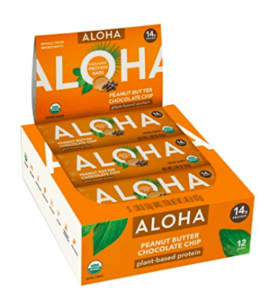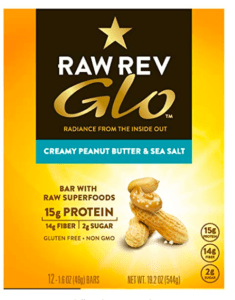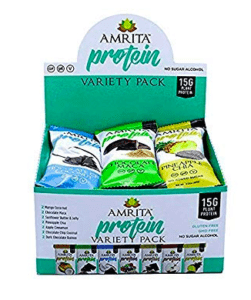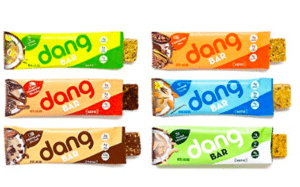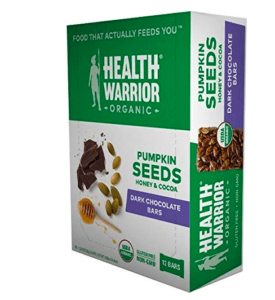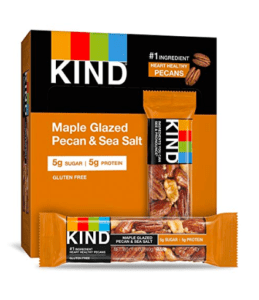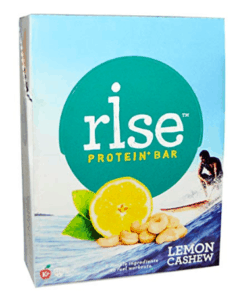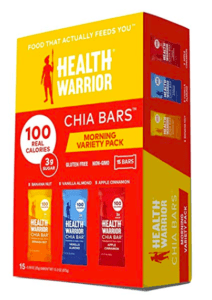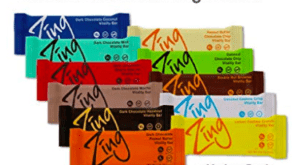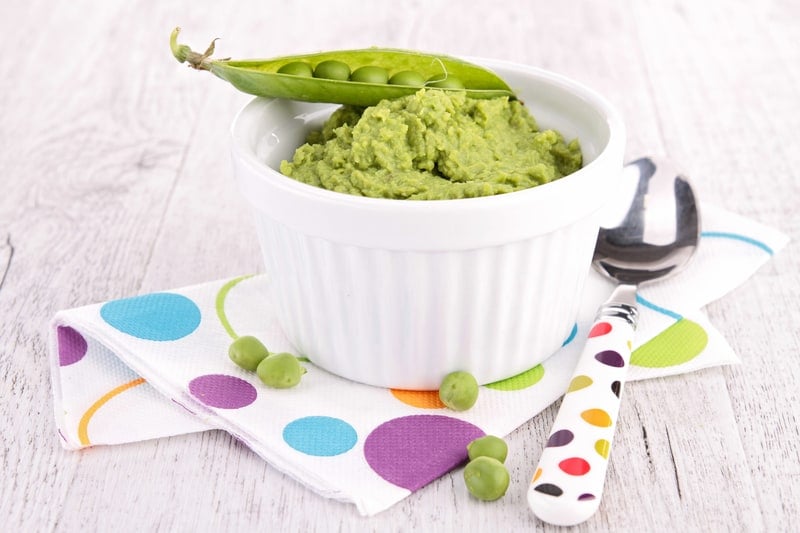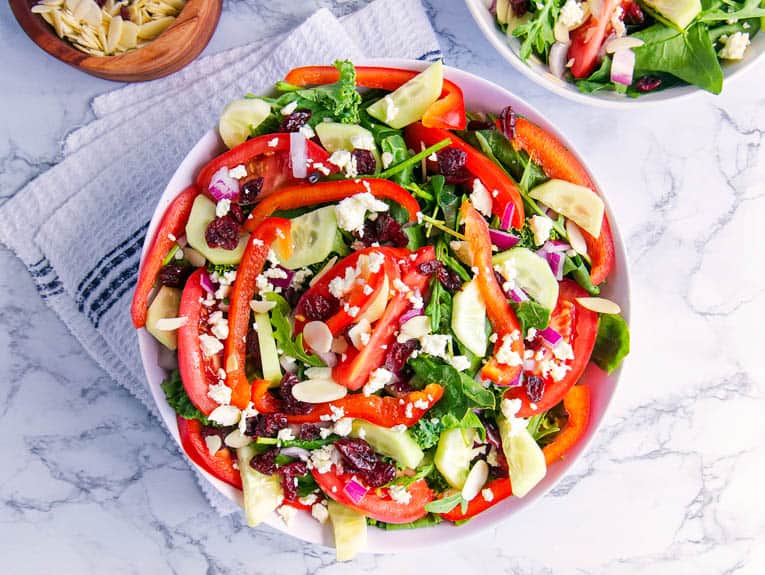Best Vegan Protein Bars for Your Health
This post may contain affiliate links. As an Amazon Associate, I earn from qualifying purchases. Please read my disclosure.Are you looking for the healthiest vegan protein bars on the market today? This guide will help you determine what to look for when buying a vegan protein bar and what to avoid. You will learn how much protein adults really need, which vegan protein bars I recommend and why, and what’s wrong with most protein bars on the market.
Protein bars are an easy and quick solution when you’re on the go: to take to the gym for a post workout boost, grabbing one as you’re heading out the door in the morning, or picking one up for a healthy snack. Protein is essential for our health and wellbeing. It helps build muscle, stabilize blood sugar, aids in weight loss, and is also linked to bone health.
However, not all protein bars are created equal. In fact, most protein bars have a long list of processed ingredients, high sugar content, artificial sweeteners, and even harmful heavy metals! The problem is, almost all protein bars are marketed as healthy, even though most of them are not. It’s important to know what to look for and what to avoid, so that you can choose a healthy vegan protein bar for your needs.
That’s where this guide comes in! These are my picks for the best vegan protein bars on the market today. Below you’ll find a list of my top 10 vegan protein bars. Later on in this post I’ll explain how much protein adults need, whether or not vegan protein bars are a good solution to increase your protein intake, and what to look for and avoid so you can choose the best vegan protein bar for you!
Best Vegan Protein Bars
Runners Up for the Best Vegan Protein Bars
These protein bars have many healthy elements as mentioned above but fall short on a few areas (typically just a little higher in sugar than I’d like!)
These are the vegan protein bars on the market that I’d recommend if you’re looking for a healthy option for you and your family. So what should you be looking for and what should you avoid when it comes to vegan protein bars?
Ingredients to Avoid When Buying Protein Bars
No Artificial Sweeteners: Artificial sweeteners are chemicals. While they don’t contain added calories, they trick your body into craving more sugar or artificial ingredients which then causes you to consume even more calories. They can also cause your blood sugar to spike and crash similar to regular table sugar. Artificial sweeteners can be “hidden” under many names – so lookout for the following ingredients…
- Aspartame sold as NutraSweet, Equal, or Sugar Twin,
- Acesulfame potassium sold as Sunnet or Sweet One
- Aspartame-acesulfame salt, sold as TwinSweet
- Neotame, sold under the brand name Newtame.
- Saccharin, sold as Sweet’N Low, Sweet Twin, or Necta Sweet.
- Sucralose, sold as Splenda
No Processed Soy Isolate: Soy isolate protein is derived when the soybean undergoes processing to strip it of its nutrients and “isolate” the protein. Through this process other substances such as aluminum and hexane are left behind. In addition, the method used to isolate the protein can form nitrites which can form carcinogens in the body.
No Heavy Metals: Avoid protein bars containing heavy metals as these have been linked to cancer, brain damage, and reproductive problems.
QUALITIES TO LOOK FOR IN THE BEST PROTEIN BARS
- Organic Whenever Possible: Organic protein bars are best since you’ll be less likely to consume harmful pesticide residue.
- At Least 5 grams of Protein Per Serving: A protein bar should contain protein. If it has less than 5 grams of protein it’s not a protein bar, it’s just a snack bar.
- Less than 250 Calories: Your protein bar should not be a meal replacement, or sugary treat. Rather it should help you as a pre or post workout recovery snack or a quick mini-meal on the go.
- Non-GMO: GMOs are genetically engineered crops that are made to be resistant to Round-Up and produce their own insecticide. It’s best to avoid GMOs since they are typically contaminated with glyphosate, a likely carcinogen.
- Total Sugar – 6 grams or Less: You want to keep your blood sugar steady. Consuming more than 6 grams of sugar means you’re crossing over into dessert.
So how does our list of bars stack up? Here are the details behind each of the protein bars on our list – with pros and cons for each!
10 Best Vegan Protein Bars
ALOHA Organic
These organic non-GMO bars have 240 calories, 13 grams of fiber, 14 grams of protein and 4 grams of sugar. They’re free from stevia, and soy.
Pros
Cons
Raw Rev Glo Protein Bars
These non-GMO bars contain 180 calories, 15 grams of plant-based protein, 14 grams of fiber, and only 2 grams of sugar. They’re free from preservatives, soy isolate, and sugar alcohols.
Pros
Cons
Amrita Foods
These protein bars use plant-based ingredients with no added sugar. They have 230 calories, 4 grams of fiber, 2 grams of added sugar, 15 grams of protein, and are free of the top 9 most common allergens. They also contain 12 superfoods in each bar.
Pros
Cons
Dang Bar
With no sugar alcohols or artificial sweeteners these organic bars have 210 calories, 6 grams of fiber, only 2 grams of sugar, and 10 grams of protein.
Pros
Cons
Health Warrior Pumpkin Seed Protein Bars
These organic bars are gluten free, soy free, dairy free, and Non GMO. They have 170 calories per bar, 8 grams of protein, 6 grams of sugar, 2 grams of fiber, and make for a good post-workout recovery bar because they’re a good source of magnesium.
Pros
Cons
KIND Bars
The Maple Pecan KIND Bars have 5 grams of protein and 5 grams of fiber which comes from pecans, almonds, and peanuts. They are relatively low in sugar with 5 grams, and have 200 calories. KIND makes a large variety of bars, so be careful when choosing a bar from them (not all bars are low in sugar like these!) If you choose a different KIND bar flavor, make sure its got 5-6 grams of sugar or less per bar.
Pros
Cons
RISE Plant Based Protein Bars
These non-GMO bars have 280 calories, 4 grams of fiber, 15 grams of plant-protein and 13 grams of sugar from coconut nectar. Includes 4 simple ingredients.
Pros
Cons
Health Warrior Chia Bars
These 100 calorie bars are both vegan and gluten-free. Each bar has 5 grams of fiber, 3 grams of sugar and 3 grams of protein.
Pros
Cons
Zing Bar
These vegan bars have a large variety of flavors, and about 220 calories on average per bar. They also contain about 7 grams of fiber, 10 grams of protein and 9 grams of sugar.
Pros
Cons
Good! Snacks
These non-GMO soy free bars have 220 calories, 11 grams of fiber, 15 grams of protein and 10 grams of sugar.
Pros
Cons
What protein bars are vegan?
When buying vegan protein bars, look for ones that are certified vegan and don’t contain animal products (e.g. whey, collagen, etc.). Always read labels as ingredients often change and are not always the same from one type of bar to another. Below is a list of brands that make vegan protein bars.
- Aloha
- Evo
- Health Warrior
- Perfect Bar
- Pure
- Rise
- Amrita
- Garden of Life
- Simply Protein Bar
- Raw Rev Go
- Rise Bar
- D’s Naturals
- Sun Warrior
The list above includes many of the brands that make vegan protein bars. I’ve narrowed this list further to the top 10 best vegan protein bars that are actually healthy for you and have natural ingredients, low added sugars, high protein, and are organic and/or non-GMO.
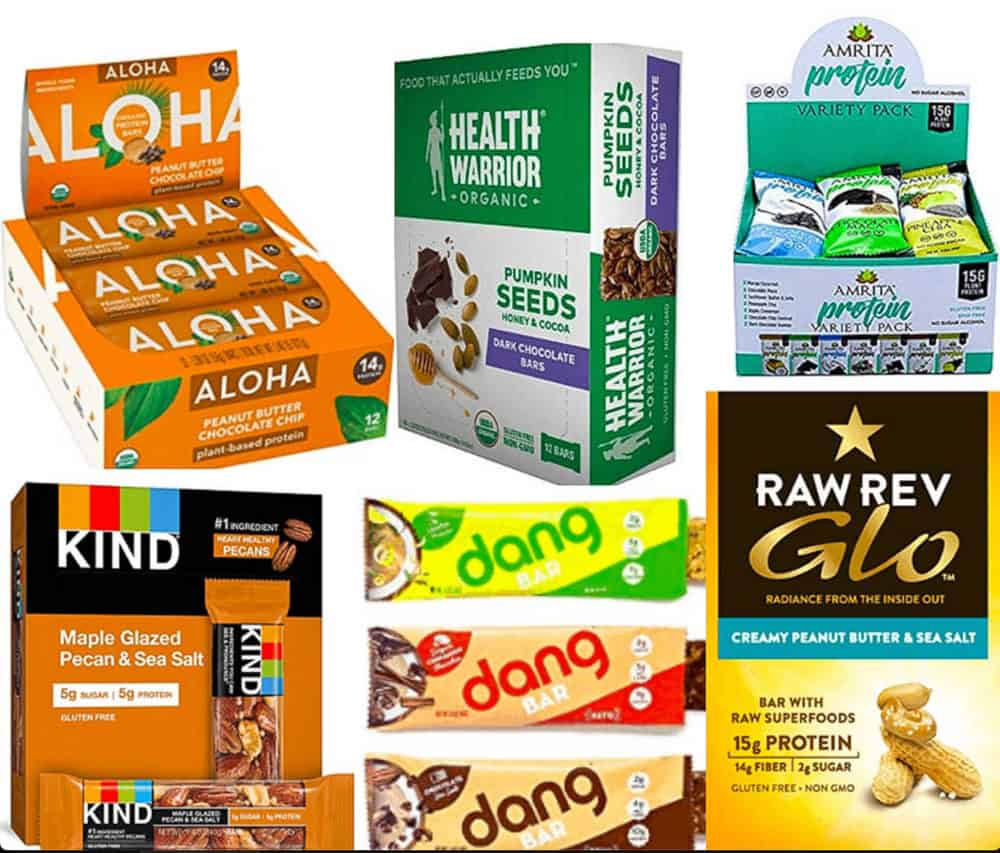
How much protein do adults need?
There is much debate in the medical community regarding how much protein adults need to consume on a daily basis to maintain good health. Age, gender, weight, and activity level all play a role in how much protein each individual needs.
A basic recommendation for protein intake is .8 grams per kilogram of body weight. A simple way to get an estimate of your daily protein needs is to take your body weight and multiply it by .36. For example, if you’re a woman weighing 150 pounds your recommended daily protein would be 54 grams.
However, this calculation has raised some debate as some researchers claim this number prevents protein deficiency but isn’t necessarily the best number for optimal health depending on a person’s body composition goals, daily activity, gender, or age.
If you’re weight training or participate in high intensity activities your daily intake of protein could be as much as .64-.9 grams per pound. As in our example above a 150 pound person would need between 95-135 grams of protein a day. And bodybuilders often follow the rule of 1:1 when it comes to protein, meaning 150 pound individual would need 150 grams of protein per day.
As you can see the range of protein needs varies drastically depending on whether you’re just trying to keep from being protein deficient to whether you’re trying to build muscle. From 54 grams to 150 grams of recommended protein a day it can be confusing to know where you fall in your daily needs.
If you’re concerned about your protein intake and want to know specifically how much protein you need based on your health goals, age, activity level and gender consult your doctor or dietician.
Are vegan protein bars a good solution to increase your intake of protein?
Protein bars both vegan and non-vegan can seem like the perfect solution to easily increase your daily protein intake. They are convenient, you can take them on the go. They don’t need any prep or refrigeration like a protein shake or smoothie. But before you head off to Costco to stock up on a giant size box of protein bars take a closer look at what you’re really consuming.
Many of the protein bars on the market today contain upwards of 30 grams of sugar and more calories than a candy bar. In addition, when you take a look at the ingredient label you’ll find a long list of processed ingredients, hydrogenated oils (which are trans-fats), artificial sugars and sugar alcohols, corn syrup, and other chemically processed ingredients.
While you should try to rely on whole foods the majority of the time for your protein and other macro and micro nutrients, incorporating the protein bars on my list occasionally is totally fine since they don’t contain any harmful ingredients.
There are many vegan protein bars on the market, but most of them are just not good for you. However, you can’t go wrong with any of the protein bars on this list. I hope this list of the best vegan protein bars helps you find a convenient and healthy bar for your health and fitness needs!
CHECK OUT THESE OTHER HEALTHY FOOD / GROCERY STORE GUIDES!
- Best Protein Powders for Women
- Healthiest Nut Butters
- No Cow Protein Bars Review
- Healthiest Bread
- Healthiest Cereals
- Best Vitamins for Kids
- Best Organic Baby Formula




